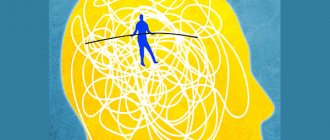Medical information is reliable Checked by Shaidullin Renat Flyurovich
Reason and emotions... They write a lot about them and often talk about them. Mismatch between the intellectual and emotional spheres at the personal level, the destruction of their delicate balance is a real threat to health. Psychiatrists and psychologists call inconsistency (disconnection) of a person’s inner “I” schizoid personality disorder (SPD). The schizoid organization of the psyche is full of contrasts: a person’s external emotionlessness turns into internal creativity, the desire to protect personal boundaries correlates with the desire to violate the boundaries of another person. How does the disease manifest? Is it a death sentence or treatable?
Specialists at Dr. Isaev’s psychiatric clinic provide treatment for schizoid personality disorder in Moscow, invariably achieving stable results in remission. If you suspect that your subtle psycho-emotional world is disturbed and are trying to understand the causes of this condition, call us at the phone number listed on the website. The psychologist on duty will advise you free of charge and invite you to attend an appointment with a specialized doctor. Don’t refuse to get help, because correction in the early stages gives lasting results in a short time.
What is schizoid personality disorder?
Violations of this profile are disorders of an eccentric nature. The complexity of the dysfunction lies in the negative impact of SPD on all areas of life. Uncommunicative people, immersed in their own inner world, cannot create full-fledged families, and have a poor attitude towards fulfilling their own responsibilities. Conversation with themselves is more important to them than dialogue with others. They rarely smile and are prone to constant fantasizing.
Psychiatrists do not distinguish the concept of “schizoid” syndrome. It is often understood as Asperger's syndrome (a type of autism). While outwardly similar in the desire for isolation and avoidance of contact with the external environment, schizoid personality disorder and Asperger's disease have significant differences in symptoms and manifest themselves in different ways. While Asperger's syndrome is clearly evident in early childhood, SPD only becomes clear in adolescence.
Accentuation has nothing to do with impaired socialization. Persons with schizoid accentuation easily adapt to the situation. They interact well with society, are successful in their careers and are quite capable of building harmonious relationships with other people. The only thing that can “bring them closer” to schizoids is stress. Under conditions of strong psychological stress, the boundaries between accentuation and disorder are blurred. Being in conditions of constant stress threatens people with accentuation of the schizoid type with the development of schizoid personality disorder.
The psychiatric department of Dr. Isaev’s clinic specializes, among other things, in the treatment of patients with SPD. Patients with a complex illness bordering on schizophrenia require special attention from doctors. It should be noted that the disease often manifests itself in people who have relatives with schizophrenia. Only experienced doctors are able to conduct a competent diagnosis, distinguish between a disorder, syndrome, accentuation and prescribe competent treatment.
Schizoid personality disorder - symptoms and treatment
Theoretical reflections on the nature of schizoid personality disorder (SPD) have given rise to numerous discussions among psychiatrists and psychoanalysts. Today, this personality disorder is understood as a borderline type of mental organization, which, from the point of view of intrapsychic structure, is characterized by disunity of the inner self, namely, a mismatch between the emotional and intellectual spheres. Such people outwardly seem withdrawn, thoughtful, they practically do not express emotions at all, show indifference to social interactions (to praise or criticism, including), their behavior is usually non-standard, eccentric, and sometimes pretentious.
Individuals with this personality disorder often do not have access to what they are feeling, what they are thinking about and what needs they are experiencing at that moment. However, despite this combination of contradictory traits and actions, as well as a seemingly poor emotional palette, people with a schizoid organization are creative and capable of creating close relationships with other people (which, however, is quite rare). They, along with strong protection of their personal boundaries, are careful and respectful of the boundaries of others. Many of them find their calling in art, in theoretical and exact sciences, as well as in philosophical and spiritual knowledge.[1][2][5][6]
Prevalence of schizoid personality disorder
According to DSM-5 and modern research, the incidence of this disorder is about 5% of the entire world population.[4]
SPD is more often diagnosed in men. In a study of patients with depression, schizoid disorder was found in 3% of men and only 0.8% of women.[10] The reasons for this relationship are not entirely clear. Researchers have suggested that some symptoms of SPD are similar to traits traditionally considered feminine, leading clinicians to misdiagnose. But other scientists have refuted these hypotheses.[11]
Causes of schizoid personality disorder
The exact cause of SPD is unknown. Clinical experience suggests that these people are temperamentally hyper-reactive and easily react to even minor stimulation. Patients themselves usually characterize themselves as naturally sensitive, intuitive, and sensitive to the world. As children, they could wake up from any rustle; they hid and cowered from loud sounds or sudden movements of adults.
SPD, like other disorders, develops from childhood, but a final diagnosis is made only after adulthood, since a person's personality can change with age.[12]
Schizoid personality disorder in children and adolescents
Psychoanalysts' observations of newborns have shown that infants prone to a schizoid personality structure tense up and even lean back when caring parents try to hug them. Phenomenologically, this is the protection of one’s comfort and safety from the invasion of another, even a close person.
By the age of 3-4, these children show signs of schizoid disorder much more clearly: they choose quiet, calm, solitary games and have little need for the care of relatives. At an older age, they begin to ask philosophical questions (for example, about the origin of the world, etc.), show interest in the abstract, the unknown, the secret, as well as unusually explain everyday things and see the environment wider than others can do.
Children with SPD try to communicate less with others. As they grow up, they choose jobs that allow them to avoid interacting with people, even if such jobs are below their level of ability. They often sacrifice intimacy in order to maintain autonomy. Vague, impoverished or overly specific speech, limited eye contact and intonation make communication even more difficult.
Some people with schizoid disorder gravitate towards a traditional lifestyle, but most do not respond well to social stimuli. For this reason, they may become emotionally attached to inanimate objects or animals rather than people.[13][14]
The huge tragedy of schizoid children is the lack of empathy on the part of the people around them, even on the part of their parents. Their alienation, which also brings suffering, begins with a feeling of misunderstanding and devaluation by others.
Studies have shown that school-aged children with SPD had impaired empathy, had odd communication styles, and were prone to loneliness. They are also characterized by increased interpersonal sensitivity and mental rigidity, that is, a lack of flexibility in habits and behavior.
Contrary to the assumption of personality variability, signs of SPD were stable: many subjects were diagnosed with the disorder in adulthood. In addition, two children eventually developed schizophrenia.[15][16][17]
Causes of the disease
According to statistics, 5% of the planet's population suffers from pathology. The tendency to develop the disease manifests itself in childhood. Hyperactive children are usually hypersensitive. While studying psychopathology, scientists noticed that already in infancy such children clearly define their personal boundaries, reacting rather strangely to the touch of adults. They instinctively deviate when their parents approach.
Schizoid personality organization does not mean that it is the beginning of the schizophrenic process and will contribute to the development of schizophrenia. Moreover, a large percentage of schizophrenics are people who previously had pronounced signs of SPD syndrome. A person with schizoid personality disorder is capable of self-identification: he experiences shame, guilt and perceives the world in its real manifestation. Concern for safety is the main manifestation of the disease.
There are several theories explaining the reasons for the development of the disease. A number of researchers believe that SPD is stimulated by gene mutations (mutation theory). Environmental pollution leads to “breakdowns” of the DNA code. Gene disorders are transmitted to descendants. Other scientists see the reasons in the low self-esteem of the individual himself. Still others are the lack of attention to the child from adults and his subsequent isolation. Fourth - in increased mental activity, expressed in control over every action and the simultaneous inability to express one’s own thoughts and come to conclusions.
At Dr. Isaev’s psychiatric center, research into the causes of SPD is given special importance. Treatment directly depends on what exactly contributed to the development of the pathology: inability to respect oneself, cerebral/endocrine insufficiency, abuse in childhood by parents, lack of skill in establishing emotional contact with others, the desire for self-isolation, or something else.
Causes of schizoid disorder
Like schizophrenia, schizoid disorder can develop for a variety of reasons. Let's look at the most common of them, and gradually add others. We invite you to this work too. Write additions to our dictionary in the comments to the entries. We are confident that together we will compile the most complete, relevant and useful reference book for current and future addiction psychiatrists.
Dissatisfaction with relationships with people
Proponents of the theory of object relations, the basis of this disease is dissatisfaction in communicating with people. In their opinion, parents of schizoids (as well as parents of those suffering from paranoia
) either simply ignored their children or behaved cruelly towards them. As a result, paranoids begin to show fears and mistrust, and schizoids begin to show a complete inability to show and accept love and respect. They begin, therefore, to completely isolate themselves from people (often even from the closest ones) and relationships.
Patient personality disorder
The second common reason is a disorder of the patient’s immediate personality, causing low self-esteem. The patient does not know and cannot understand himself, and therefore cannot establish and develop relationships with anyone else. Even relationships with close relatives and other well-known people are difficult for such patients - they consider themselves unworthy of these relationships, many feel that for some reason they have become much worse than they were before.
Thought disorder
Thinking disorders are also not uncommon in schizoid patients. As a rule, their thoughts are not coherent, and they have difficulty assessing the situation and perceiving information about the environment. They often cannot grasp the emotional reactions of other people and respond adequately to them. Proponents of this theory argue that children with schizoid disorder develop slower speech and motor skills, regardless of their intellectual level.
Problems with the endocrine and cerebral systems of the body
The fourth group of reasons usually includes reasons associated with deviations in the functioning of the endocrine and cerebral systems of the human body. The main ideologist of the connection between the diseases of these systems and schizoid psychopathy was the famous Grunya Efimovna Sukhareva
- an outstanding Soviet psychiatrist, one of the founders of child psychiatry.
Heredity
Many scientists are inclined to believe that schizoid personality disorder can be transmitted through genes, that is, it can be a hereditary disorder. In addition, it is not the disorder itself that can be transmitted, but the reasons why it occurs - for example, deviations in the functioning of the endocrine and cerebral systems.
Symptoms of schizoid personality disorder
The disease is difficult to diagnose. In order not to make a mistake in prescribing treatment, the doctor must be convinced that the patient has at least four of the following symptoms:
- inability to enjoy close relationships (relatives, family);
- persistent desire for solitude;
- loss of interest in sex;
- satisfaction from a limited number of activities;
- small social circle (preference for relatives over friends);
- indifference to blame or praise;
- emotional coldness.
A large number of contacts and social roles are clearly not for them. The most attractive thing is to perform responsibilities alone. However, this rule does not apply to everyone. Schizoids cannot be accused of primitivism. Many of them achieve heights in their careers and create surprisingly close and harmonious relationships.
Schizoids can be expansive or sensitive. Strong-willed people (expansivists) usually act under the influence of their own judgments. They are easily vulnerable and are responsible for violating their own boundaries with negativity and short, sharp phrases. The lack of a social environment and friends does not bother them much. Sensitive schizoids withdraw into themselves. Vulnerable people who do not strive for aggression constantly experience dissatisfaction with themselves. They are prone to various types of addictions: emotional, alcohol, drugs.
Manifestation of SPD in men
Men with schizoid personality disorder do not seek pleasure. They are not happy about holidays, art and meeting with friends. They do not go to the top of their careers. Such people show equal indifference to grief and joy. Emotionally cold natures are rarely capable of sympathy and empathy. Men tend to suffer from decreased libido. Interest in the opposite sex decreases, the need for intimate relationships is practically absent. Maintaining one's own status in society is a real problem for schizoid men. The opinions of others are of little interest to them. Indifference to praise and criticism does not at all contribute to the harmonization of relationships.
Men with SPD are not interested in politics. The lack of curiosity and sustained interest in something can be compensated for in schizoids by the emergence of a hobby. A very “childish” hobby traditionally shocks others. A grown man suddenly starts collecting butterflies, matchboxes, postcards and chocolate candy wrappers.
Clinical variants of psychopathy. Schizoid psychopathy
A group of schizoid psychopaths. The most typical signs of schizoid psychopathy are autism and isolation from reality, inability to form attachments and, hence, a narrow circle of close people, indifference to many aspects of life and impoverishment of emotions, inability to express one’s feelings, underdeveloped empathy and sense of humor. The interests, hobbies and occupations of schizoid psychopaths are very unique: their choice is not related to the influence of others or what society requires and values, but, most likely, to fantasies, which for patients may be more significant than what is happening in reality.
A schizoid can devote all his time to useless and unnecessary things, leaving urgent needs and problems unattended. Schizoids are capable of deeply experiencing universal human values and suffering for the fate of humanity, but specific people with their worries, joys and misfortunes usually worry them little. It is believed that schizoids are insensitive to praise and blame, but this is not entirely true. It all depends on how schizoids perceive and evaluate them. They may be upset by praise and happy by blame if their whimsical interpretations link them to values that are incomprehensible to others.
| | Is the psychopathy of a loved one preventing you from living life to the fullest? Contact our psychiatric clinic. We will help! |
Outwardly, schizoids are usually awkward, clumsy, angular, their clothes and hairstyle are not designed to attract the attention of others, more often they are completely indifferent to how they look and leave the impression of people for whom fashion means nothing. Sometimes with their appearance they want to express devotion to some important ideas, for example, their political sympathies. It is difficult for them to find a common language with other people, who for schizoids exist as if in a different semantic dimension. The thinking of schizoids is also peculiar.
They tend to place logical accents that are not always clear or close to those around them and perceive their surroundings from an unexpected perspective; their reasoning is often abstract, “abstruse” in nature. They write in a complex, cumbersome, vague manner, as if not striving to be understood; their speech can be florid, lacking in simplicity and clarity, sometimes replete with logical inconsistencies, and in style sometimes approaches bookish, not suitable for dialogue. The mental structures of patients, due to the latter’s alienation from society, represent formations made up of a mixture of real impressions and figments of the imagination. The laws of social psychology do not apply to schizoids.
In their professional activities, schizoids prefer activities where they have to operate with diagrams, symbols, abstract concepts, calculations, computer programs, and texts. Working in a team, which requires constant communication, is not attractive to schizoids or seems repulsive to them.
Schizoid psychopaths are a heterogeneous group of individuals. There is a type of creative schizoids who are capable of achieving significant heights in philosophy, science, artistic, and usually formal creativity. At the same time, they are so deeply immersed in the relevant activities that they pay almost no attention to their personal lives, often remaining lonely and childless. There are “eccentrics” - “people with oddities”, unpredictable decisions and actions, strange hobbies and activities, eccentric antics. There are emotionally cold, “unemotional” schizoids with an almost complete absence of prosocial tendencies and the ability to compassion.
Pursuing any of their goals, they can be very cruel or, better said, ruthless. Closely related to schizoids are dreamers - psychopaths who live their real lives in the imagination, in a fantasy world. They are unable to adapt to real life due to their inactivity, lack of living interests, attractive goals, and ability to repel the challenges of reality. Finally, there is a type of schizoid misanthrope who has accepted or constructed their own theories about the incorrigible depravity of man. There are many works of literature, poetry, science and fine art, the creation of which is motivated by the desire to discredit a person, to belittle him in every possible way, to present him in the guise of a fiend of hell.
Schizoids rarely achieve a happy personal life. The sex life of many schizoids is not attractive; they rarely burn with love passion. Other schizoids are unable to maintain normal sexual relationships. The tendency to fantasize contributes to the formation of various kinds of sexual deviations in them. Schizoids have little interest in power, wealth, career, fame, pleasure, and their lifestyle often approaches asceticism. Schizoids are internally contradictory natures.
They may be plagued by incompatible tendencies, ideas, attitudes and feelings. They can be extremely negative and at the same time very suggestible, indifferent and irritable, emotionally cold and hypersensitive, capriciously selective in their sympathies and indifferent. Their sense of proportion very often changes; they are often maximalists, as if their development had stopped in adolescence. In general, schizoids still love only themselves. Being egoists, they, moreover, have an extremely high opinion of themselves, their abilities, and rarely know how to “truly appreciate other people, even if they treat them well” (P.B. Gannushkin).
Illustration (from Carson et al.). Patient D., 33 years old, highly gifted, with a high level of introversion, computer analyst, was referred for a psychological examination by his doctor. The doctor was concerned that D. might be unhappy and suffering from depression. Recently, on the advice of his boss, D. went to the doctor due to rather vague somatic complaints and a general gloomy outlook on life. D. practically did not communicate with people. He lived alone, worked in a small office on his own. At work, as a rule, he also did not see anyone, except for occasional visits from his boss, who came to give him a new task and pick up finished programs. He ate lunch alone. Once a week, on fine days, D. went to the zoo during his lunch break.
All his life D. avoided people. As a child, he had few friends. He always preferred solitary activities to family outings (he was the eldest of five children). In high school, he never dated girls, and during his student years he only once found himself in a female society - in a company of students, after a sports match. True, D. was actively involved in sports and was a member of the football team at school and college. When he was a student, he socialized a lot with one relatively close friend, mostly drinking together. Now, however, this friend lived in another city.
D., as if it were something self-evident, said that it was difficult for him to make friends, he never knew how to carry on a conversation. Several times he intended to make friends with other people, but simply could not find the right words, and “the conversation died down.” D. reported that he subsequently considered changing his life to become “more positive,” but this idea never seemed worth the effort. It was easier for him to leave everything as it was, because as soon as anyone spoke to him, he was lost. He was happy when he was alone.
Back to contents
Schizoid personality disorder in women
Women's natural sociability and emotionality seem to protect the fair half of humanity from illness. Women suffer from SPD much less often than men. Motherhood also becomes a natural protection for a woman. Nature forces the mother to be emotionally contact. Otherwise, she will not be able to teach the child tender feelings, and he will grow up to be a copy of his mother.
The laws of procreation naturally eliminate all threats. If a woman still has schizoid personality disorder, it manifests itself in a less acute form. In particular, female asexuality, which is traditionally perceived by women as natural, is not so noticeable. SRD brings significantly less discomfort to women than to men.
Diagnosis of the disease
Diagnosis of SPD is made only by a psychiatrist. At the diagnosis stage, it is important to distinguish psychopathology from other mental disorders. Schizoid personality disorder is accompanied by neuroses, depression, phobias, and anxiety. A schizoid should not be confused with a narcissist. A schizoid, like a narcissist, is enough of himself, but he will never declare his merits as superiority over others. Carriers of pathology take care of their own uniqueness in a completely different way. They do not show it off, but seem to hide it, worrying that multiple contacts can destroy it.
People with SPD seem to be unable to feel. They have a very subtle mental organization. However, showing emotions is not for schizoids. Having once decided that emotions are an art of which they understand nothing, schizoids refuse to be outwardly emotional and choose coldness. Sexuality is alien to them. Rare memories of sex are confined to the need to satisfy sexual needs, nothing more.
Schizoids should not be confused with schizophrenics. The vivid fantasies of schizoids always have boundaries with the real world. This is also the cause of unbearable pain for schizoids. These people understand that their fantasies will not come true. Therefore, the inner world is closed, frankness is excluded. Why share the pain? The lack of desire for contact with the outside world leads to the fact that schizoids stop taking care of their appearance. Untidyness and sloppiness are a common manifestation of the disorder.
Unfortunately, there is no detailed classification of schizoids that can help doctors accurately diagnose the disease and choose methods for its correction. American psychologist Theodore Millon identifies the following types of schizoid personality disorder:
- sluggish: slow, phlegmatic, apathetic;
- distanced: tending to self-isolate;
- depersonalized: transferring one's own states onto someone else;
- unemotional: cold, unresponsive.
The psychiatric department of Dr. Isaev’s clinic is always a qualified diagnosis of the disease. Doctors at the center will not confuse pathology with other diseases. The diagnosis will be preceded by observation of the patient, long-term communication with him and with relatives. This is the only way to prescribe competent treatment that can return the patient to normal life.
Schizoid and psychologist
As a psychologist, I observe that people with schizoid personality disorder tend to look away when talking about something. They can tell a lot. They have a lot of introspection and are eager to share it. They appreciate it when you give them a new idea. Even if they don't agree with it, they will remember it and think about it.
The most important problems that concern them are a constant feeling of insecurity and problems in communicating with people. These are interconnected problems, since it is people who pose the greatest danger. You can't be safe with them, you can't relax.
Moreover, it is typical for schizoids to always look for the reason within themselves. They are characterized by a request for therapy, such as: “My relationship is not working out, help me understand what I’m doing wrong.” Unfortunately, this comes with a constant feeling of “something is wrong with me.” It usually takes a lot of work for a schizoid to begin to notice the other person's contribution to conflicts and problems in the relationship.
Schizoid people are usually punctual and constant. Unpleasant incidents rarely happen to them during therapy. They appreciate the attention that is paid to them, since there is usually very little of it in life, as well as frank conversations with people.
Treatment of schizoid personality disorder in Moscow
Therapy for schizoid disorder is based on a comprehensive treatment methodology. An experienced doctor competently combines neuroleptics, antipsychotics, cognitive and group therapy, a biobehaviouristic approach and psychoanalysis:
- The acute course of the disorder is treated with haloperidol. Due to the influence of the drug on the mediators of nerve fibers, the behavior of the individual is regulated. All the doctor’s efforts are directed towards correcting thinking.
- Antipsychotics risperidone, sulpiride, amisulpride, aripiprazole, etc. eliminate depression and apathy. The younger generation of drugs are very effective and have a mechanics of action similar to the antipsychotic Haloperidol.
- The task of a cognitive therapist is to teach a person to recognize and manage their emotions. Together with the patient, the doctor identifies certain feelings for observation, and analysis is started. Positive emotions play a very important role in cognitive therapy.
- Biobehavioral techniques are aimed at creating situations in which a person would experience discomfort. In the format of a role-playing game, relationships that are difficult for a person are worked out. The patient is required to show genuine feelings.
- Psychoanalysis is based on a frank conversation with the patient. The dialogue builds the existing destructive model of behavior. Corrections are made to it, errors are sorted out. The doctor gives advice to prevent the repetition of difficult situations and the emergence of new ones.
- Working in a group (collective/group therapy) aims to create a model of a healthy society. Group members are in search of the merits of those with whom they interact. Through self-acceptance comes acceptance of another. A person begins to understand how significant he is for society. Fears, complexes, unnecessary defensive reactions go away.
Of unconditional importance in the treatment of schizoid personality disorder in Moscow is the desire of the patient himself to be healed.
“The therapist’s task is to be a stable mirror image (double) who provides a fairly free, friendly space for “escaping” and does not get too close,” says Professor Gerhard Dammann, psychiatrist, psychologist, psychoanalyst, head of the psychiatric clinic Thurgau, Switzerland.
In addition to inpatient treatment, the psychiatric center of Dr. Isaev’s clinic offers . Treatment for schizoid personality disorder requires hospitalization in extremely rare cases. Not everyone wants to advertise a health problem. A doctor's home visit is the best solution. Qualified assistance can be obtained in a calm, familiar environment. If necessary, relatives can always be involved in the conversation.
Refusal of treatment for SPD is guaranteed to lead to its transition to schizophrenia or schizotypal disorder. Schizophrenia debuts with delusions, speech and thinking disorders, and hallucinations. A complication may be another psychopathological disorder: obsessive-compulsive, affective or addiction disease.
Timely consultation with a doctor will eliminate the risk of suicide. The problem of suicidality in patients with SPD, unfortunately, does exist. Suicides by schizoids are carefully planned and hidden. A self-absorbed person, unlike a hysterical person, is constantly looking for compelling reasons to justify his death. Stopping him in time is a great success.
Prevention
Families who have previously had cases of schizophrenia in their family should especially think about preventive activities in matters of schizoid personality disorder. The main condition is to reduce the number of stress factors that have a negative impact on the developing psyche of the child. It is important to teach a teenager the correct emotional response to the reactions and influences of the social environment.
The difficult but necessary task of parents is to accustom their child to the correct work and rest schedule and explain the value of a healthy diet. A culture of relaxation is important. Ideally, during adolescence, a child develops the habit of reading before bed. It will be great if he learns to prioritize listening to relaxing music over playing computer games and watching blockbusters. Preventing the recurrence of the disease is an equally important task in the compensation phase of the disease. It is important to prevent personal disharmony and a decrease in the degree of social adaptation.
“If you find out that your loved one or relative is schizoid, try to translate all your arguments into terms of reason, do not overload with emotional manifestations. Remember that there is always an internal logic in the decisions of such a person, even if his action seems strange. It is not so easy to understand, but if you figure it out, the person will become quite predictable for you. It’s not necessary to guess; you can simply ask why your friend acted this way and not otherwise,” Pavel Beschastnov, psychiatrist and psychotherapist.
If a person, regardless of the treatment and rehabilitation therapy completed, still resumes the usual reactions: increased anxiety, deception of perception reappear, thinking is disorganized, it is necessary to consult a doctor. A psychiatrist will prescribe antipsychotic drugs and thereby prevent the disorder from transforming into a deeper mental disorder. Severe forms of psychosis will be excluded. The person will become normal again and will not interfere with the lives of others.









